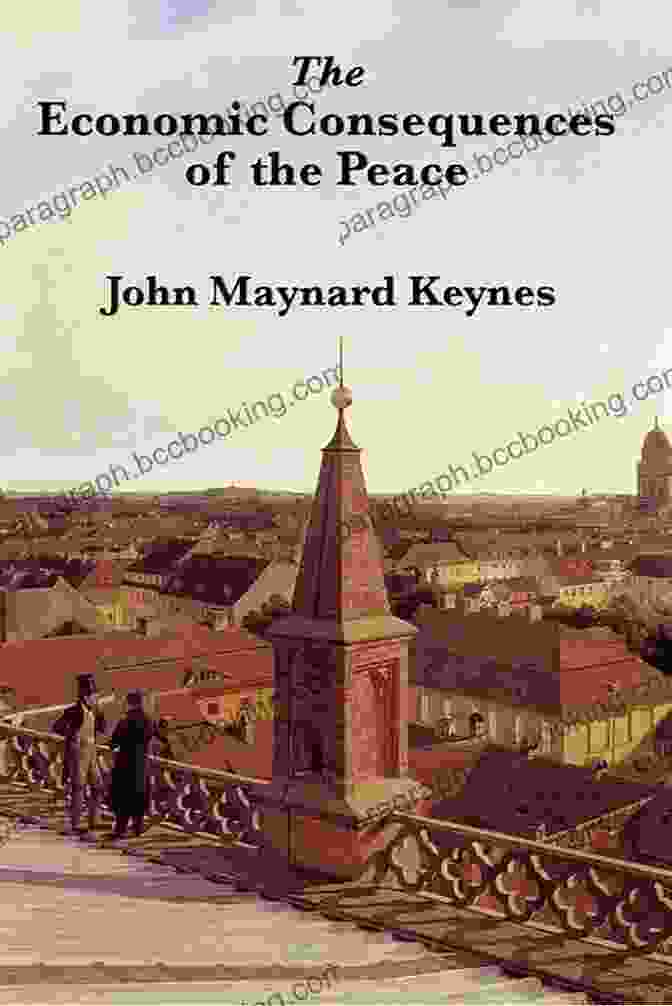Unveiling the Economic Consequences of Peace: A Book Review of John Maynard Keynes's Profound Analysis

4.4 out of 5
| Language | : | English |
| File size | : | 3181 KB |
| Text-to-Speech | : | Enabled |
| Screen Reader | : | Supported |
| Word Wise | : | Enabled |
| Print length | : | 308 pages |
The aftermath of war often leaves behind a complex web of economic challenges. As nations struggle to rebuild and recover, they must confront the devastating consequences of conflict. In his groundbreaking work, "The Economic Consequences of Peace," John Maynard Keynes provides a comprehensive analysis of the economic implications of World War I. Through a meticulous examination of reparations, inflation, and the complexities of post-war recovery, Keynes unveils the profound economic consequences of peace.
Keynes's insights remain relevant today, offering valuable lessons for understanding the economic challenges faced by nations emerging from periods of conflict. This article delves into the key arguments presented in "The Economic Consequences of Peace," examining Keynes's analysis of reparations, inflation, and the challenges of rebuilding a war-torn world.
Keynes's Analysis of Reparations
One of the central themes in "The Economic Consequences of Peace" is Keynes's critique of the reparations imposed on Germany after World War I. Keynes argued that the excessive reparations demanded by the victorious powers were unsustainable and would have devastating consequences for the German economy.
Keynes contended that reparations would cripple Germany's ability to pay its debts, leading to economic instability and social unrest. He also warned that reparations would stifle Germany's economic growth, preventing it from contributing to the overall economic recovery of Europe.
Time has proven Keynes's predictions correct. The excessive reparations imposed on Germany contributed to the country's economic collapse and the rise of Adolf Hitler. The consequences of these reparations continue to resonate today, underscoring the importance of Keynes's analysis.
Inflation: A Post-War Scourge
Another major focus of "The Economic Consequences of Peace" is Keynes's analysis of inflation. Keynes argued that the war had created a massive increase in the supply of money, leading to a sharp rise in prices. This inflation, Keynes contended, was undermining the purchasing power of ordinary citizens and threatening the stability of the global economy.
Keynes warned that inflation could spiral out of control if left unchecked. He urged governments to take steps to reduce the money supply and stabilize prices. However, his advice was largely ignored, and inflation continued to plague many countries in the aftermath of the war.
Keynes's insights into inflation remain essential for understanding the economic challenges faced by nations emerging from conflict. Inflation can erode the value of savings, destabilize financial markets, and undermine economic growth. Keynes's analysis provides valuable lessons for policymakers seeking to avoid the pitfalls of inflation.
Rebuilding a War-Torn World
In addition to his analysis of reparations and inflation, Keynes also examined the challenges of rebuilding a war-torn world. He argued that the process of recovery would be complex and would require a concerted effort from all nations.
Keynes emphasized the importance of international cooperation and coordination. He believed that nations should work together to rebuild infrastructure, promote economic growth, and establish a lasting peace. He also stressed the need for social justice and economic equality, arguing that these were essential foundations for a stable and prosperous world.
Keynes's vision for post-war recovery remains an inspiration today. In the aftermath of conflicts, nations must find ways to come together and work towards a common goal of rebuilding and reconciliation. Keynes's insights provide valuable guidance for navigating the challenges of post-war recovery.
John Maynard Keynes's "The Economic Consequences of Peace" remains a seminal work in the field of economics. Keynes's analysis of reparations, inflation, and the challenges of rebuilding a war-torn world provides valuable insights for understanding the economic consequences of conflict.
Keynes's work is not only a historical document but also a blueprint for economic recovery. His analysis offers valuable lessons for policymakers seeking to navigate the complex economic challenges faced by nations emerging from periods of conflict. By understanding the economic consequences of peace, we can better prepare for the challenges ahead and work towards a more just and prosperous world.

4.4 out of 5
| Language | : | English |
| File size | : | 3181 KB |
| Text-to-Speech | : | Enabled |
| Screen Reader | : | Supported |
| Word Wise | : | Enabled |
| Print length | : | 308 pages |
Do you want to contribute by writing guest posts on this blog?
Please contact us and send us a resume of previous articles that you have written.
 Book
Book Novel
Novel Page
Page Chapter
Chapter Text
Text Story
Story Genre
Genre Reader
Reader Library
Library Paperback
Paperback E-book
E-book Magazine
Magazine Newspaper
Newspaper Paragraph
Paragraph Sentence
Sentence Bookmark
Bookmark Shelf
Shelf Glossary
Glossary Bibliography
Bibliography Foreword
Foreword Preface
Preface Synopsis
Synopsis Annotation
Annotation Footnote
Footnote Manuscript
Manuscript Scroll
Scroll Codex
Codex Tome
Tome Bestseller
Bestseller Classics
Classics Library card
Library card Narrative
Narrative Biography
Biography Autobiography
Autobiography Memoir
Memoir Reference
Reference Encyclopedia
Encyclopedia Michael Burnette
Michael Burnette Joseph Starzyk
Joseph Starzyk John W F Dulles
John W F Dulles Sherry Marker
Sherry Marker Joseph Assaf
Joseph Assaf Joi Barrios
Joi Barrios Tetsuko Kuroyanagi
Tetsuko Kuroyanagi Lorenzo Cano
Lorenzo Cano Jonathan Rosenbaum
Jonathan Rosenbaum Jonathan Kellerman
Jonathan Kellerman Johnette Howard
Johnette Howard Juanitta Baldwin
Juanitta Baldwin Melissa Cleeman
Melissa Cleeman Kyler Shumway
Kyler Shumway Joyce Rupp
Joyce Rupp Rob Gifford
Rob Gifford Johnny Molloy
Johnny Molloy John Walters
John Walters Luke Walford
Luke Walford Lieven Vandenberghe
Lieven Vandenberghe
Light bulbAdvertise smarter! Our strategic ad space ensures maximum exposure. Reserve your spot today!

 Ryūnosuke AkutagawaJourney into the Heart of the Forest: Uncover the Secrets of Deep Forests,...
Ryūnosuke AkutagawaJourney into the Heart of the Forest: Uncover the Secrets of Deep Forests,... Raymond ParkerFollow ·11.6k
Raymond ParkerFollow ·11.6k Joseph ConradFollow ·10.6k
Joseph ConradFollow ·10.6k Geoffrey BlairFollow ·14k
Geoffrey BlairFollow ·14k Ray BlairFollow ·14.8k
Ray BlairFollow ·14.8k Hunter MitchellFollow ·8.1k
Hunter MitchellFollow ·8.1k Avery SimmonsFollow ·6.4k
Avery SimmonsFollow ·6.4k Jamie BlairFollow ·9.9k
Jamie BlairFollow ·9.9k Finn CoxFollow ·18k
Finn CoxFollow ·18k

 Joseph Foster
Joseph FosterUnravel the Enigmatic Murders in "Pride and...
Dive into a World...

 Jeffery Bell
Jeffery BellTrauma-Focused CBT for Children and Adolescents: The...
Trauma is a...

 Jorge Luis Borges
Jorge Luis BorgesSense and Second Degree Murder: A Jane Austen Murder...
Prepare yourself for a...

 Chase Simmons
Chase SimmonsUnleash the Vibrant World of Watercolor: An Enchanting...
In the world of art, watercolor painting...

 Rubén Darío
Rubén DaríoAmerican Funny Animal Comics In The 20th Century: A...
Step into a bygone era of laughter and...
4.4 out of 5
| Language | : | English |
| File size | : | 3181 KB |
| Text-to-Speech | : | Enabled |
| Screen Reader | : | Supported |
| Word Wise | : | Enabled |
| Print length | : | 308 pages |












